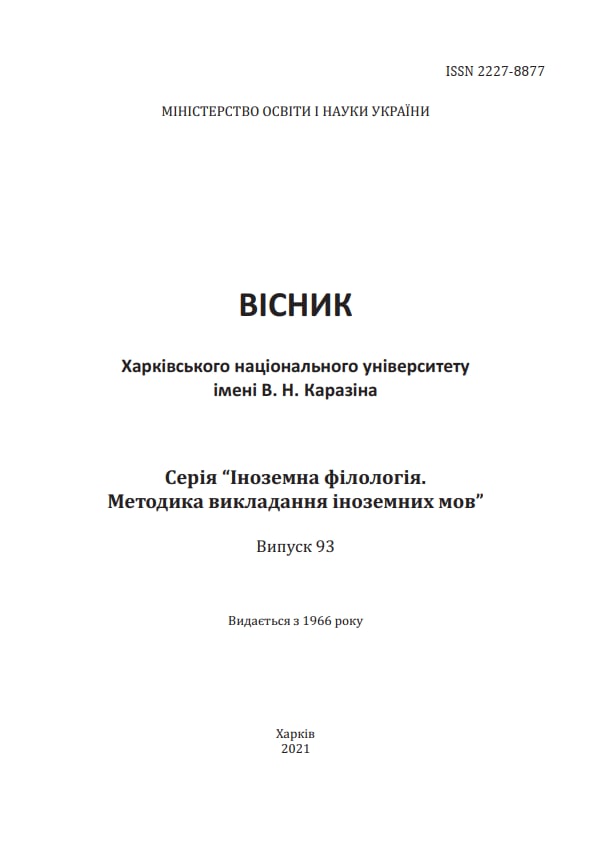The role of tutoring in mastering German languages in higher education
Abstract
The article reveals the problem of introducing quality tutoring in higher education, in particular Germanic languages. As practice shows, the number of students who want to master Germanic languages is growing; such students need to have an individual educational trajectory, where a special place belongs to the tutor. However, the problem of tutoring in domestic science is quite new, despite available works that reveal the theoretical and practical aspects of the tutoring development as a teaching profession, the issue of tutoring in mastering Germanic languages in higher education remains unnoticed by scholars, which makes the study relevant. Tutoring is an additional necessary component that complements the basic educational process; the tutor is a creative person, the leader of the study group, who conducts group classes, provides psychological support and individual assistance to students in solving educational and personal problems related to learning; provides career guidance and counselling. The quality of tutoring in mastering Germanic languages depends on the success of various interrelated work processes – Quality circle of tutoring: development of tutoring concept (determining the scope of classes, number of students, required number of tutors and educational goals), search for tutors (at the end of the previous semester with submission announcements and organizational meetings), training of tutors (professional and didactic), management of tutors (through regular meetings-consultations), assessment of tutoring (self-assessment and within the official evaluation system of the educational institution). A special place in the tutoring concept belongs to the documentation of all processes in order to analyse and transfer materials to the next generation of tutors. Tutoring is an important element of the quality management system in a modern higher education institution, as it realizes the values of individualization and self-determination. Prospects for further research are in the theoretical substantiation of the tutoring effectiveness in the mastering of German languages in higher education.
Downloads
References
Hempel, M. (2017). Yakisne tiutorstvo – posibnyk dlia vykladachiv ta kerivnykiv. Mikhael Hempel, Shtefani Vimer, Anita Zekyra, pereklad z nimetskoi Yaroslavy Ivanenko [Quality tutoring is a guide for teachers and leaders Michael Hempel, Stefani Wiemer & Anita Zekira, translated from German by Yaroslava Ivanenko]. Kyiv: NPU by Drahomanov. https://euedusci.files.wordpress.com/2018/05/d18fd0bad196d181d0bdd0b5-d182d18cd18ed182d0bed180d181d182d0b2d0be.pdf. (in Ukranian)
Kulagina, M. G. (1999). Rozhdeniye i vospitaniye detey v srede angliyskoy aristokratii v ХVII–XVIII vekakh [Birth and upbringing of children in the environment of the English aristocracy in the seventeenth and eighteenth centuries]. Vestnik vseobshchey istorii – Bulletin of universal history, 2, 82–91. (in Russian)
Kurliand, Z. N., Bartienieva, I. O., Bohdanova, I. M., Halitsan, O. A. & Hurin, R. S. (2012). Teoriia i metodyka profesiinoi osvity [Theory and methods of vocational education]. Kyiv: Znannia. https://pidru4niki.com/1029022855100/pedagogika/profesiyna_mobilnist_vikladacha_profesiynoyi_shkol. (in Ukranian)
Kuzmyn, V. M. (2017). Vykorystannia tiutorynha dlia udoskonalennia systemy upravlinnia yakistiu vyshchoi osvity [Using tutoring to improve the quality management system of higher education]. Intelekt ХХІ – Intelligence XXI, 2, 247–252. (in Ukranian)
Ministerstvo osvity i nauky Ukrainy (2014). Nakaz Ministerstva osvity i nauky Ukrainy No. 1556-VII «Pro vyshchu osvitu» [The order of the Ministry of Education and Science of Ukraine No. 1556-VII “ On Higher Education”]. Retrieved from: Retrieved from: http://zakon.rada.gov.ua/1556-19. (in Ukranian)
Sharan R. V. (2011) Vymohy do profesiinoi kompetentnosti tiutoriv u systemi dystantsiinoho navchannia SShA [Requirements for the professional competence of tutors in the USA distance learning system]. Visnyk Natsionalnoi akademii Derzhavnoi prykordonnoi sluzhby Ukrainy – Journal of the National Academy of the State Border Guard Service of Ukraine. 5, 137–141. (in Ukranian)
Shchennikov, S. A., Teslinov, A. G. & Chernyavskaya, A. G. (2006). Osnovy deyatelnosti tyutora v sisteme distantsionnogo obrazovaniya [Fundamentals of tutor activity in the system of distance education]. Moskva: OOO «Drofa». (in Russian)
Tutoring: A time-tested solution to an unprecedented pandemic. (2020). Brookings. https://www.brookings.edu/blog/brown-center-chalkboard/2020/10/06/tutoring-a-time-tested-solution-to-an-unprecedented-pandemic/.
What Tutoring is and What Tutoring is not. (2016). Schmid College of Science and Technology. https://blogs.chapman.edu/scst/2016/02/09/what-tutoring-is-and-what-tutoring-is-not/.
Zotkin, A. (2005). Ideya tyutorstva i problema subyektivnosti v obrazovanii [The idea of tutoring and the problem of subjectivity in education]. Tyutorstvo: kontseptsii. tekhnologii. Opyt. – Tutoring: concepts, technologies, experience. Tomsk. 23-35. (in Ukranian)
Zubenko, K. O. & Zaliubivska, O. B. (2018). Pro polskyi dosvid vprovadzhennia tiutorstva v systemu vyshchoi osvity [About the Polish experience of introducing tutoring in the higher education system]. Materialy XLVII naukovo-tekhnichnoi konferentsii pidrozdiliv VNTU – Proceedings of the XLVII scientific and technical conference of VNTU departments. Vinnytsia. https://conferences.vntu.edu.ua/index.php/all-hum/all-hum-2018/paper/view/5129. (in Ukranian)




